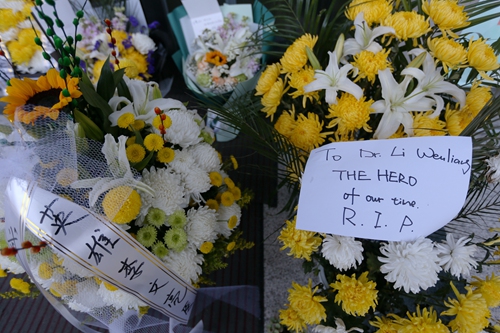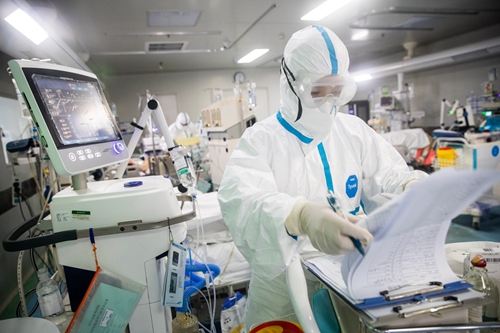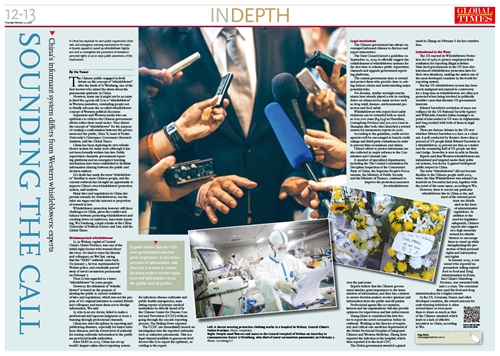HOME >> CHINA,SPECIAL-COVERAGE
China's informant system differs from Western whistleblowers: experts
By Hu Yuwei Source:Global Times Published: 2020/2/12 21:13:40
○ China has explored its own public supervision channels and emergency warning mechanisms for years
○ Experts appeal to speed up whistleblower legislation and to strengthen the protection of revelators' personal rights so as to raise public awareness of the mechanism

The Chinese public engaged in lively debate on the concept of "whistleblower" after the death of Li Wenliang, one of the first doctors who raised the alarm about the pneumonia epidemic in China.
However, many say it might not be accurate to label the 34-year-old Li as a "whistleblower" in Western narratives, reminding people not to blindly advocate the so-called whistleblower concept of Western political discourse.
Separatists and Western media who use epidemics to criticize the Chinese government efforts reflect their usual tactics. They distort the concept of "whistleblower" for the purpose of creating a confrontation between the government and the public, Shen Yi, head of Fudan University's Cyberspace Governance Research Institute, told the Global Times.
China has been exploring its own whistleblower system for many years although it has not been formally written into law. Public supervision channels, government reporting platforms and an emergency warning mechanism have been established to facilitate information sharing between the public and decision makers.
Li's death has made the term "whistleblower" familiar to more Chinese people, and the current outbreak has brought an opportunity to improve China's own whistleblower protection system, said analysts.
Many laws and regulations in China also provide rewards for whistleblowers, but the rules are vague and the amount or proportion of rewards is low.
Whistleblower protection however still faces challenges in China, given the conflict and balance between protecting whistleblowers and cracking down on malicious, inaccurate reporting, Wu Danhong, a legal scholar at the China University of Political Science and Law, told the Global Times.
Misinterpreted whistleblower
Li, in Wuhan, capital of Central China's Hubei Province, was one of the initial eight doctors who warned about the virus. He tried to warn his friends and colleagues on WeChat, saying that the "SARS" outbreak came back. On January 1, he was reprimanded by Wuhan police, and eventually passed away of novel coronavirus pneumonia on February 7.
Then Li was regarded as a brave "whistleblower" by some people.
However, the definition of "whistleblower" is based on the purpose of alerting the public to serious violations of laws and regulations, which was not the purpose of Li's original intention to remind friends and colleagues and warn them not to divulge information, Wu said.

China has strict disciplines in reporting and publicizing disasters, especially for major infectious diseases, and the lowest level of authority for issuing outbreaks information to the public are provincial health authorities.
After SARS in 2003, China has set up world's largest online direct reporting system for infectious disease outbreaks and public health emergencies, mandating reports of primary medical institutions be directly heard of by the Chinese Center for Disease Control and Prevention (CCDC) without going through the cascade reporting process, The Beijing News reported.
The CCDC can immediately launch an investigation into the reported outbreaks such as unknown pneumonia. This is a legal channel available to grassroots-level doctors like Li to report the epidemic, according to the report.
Legal mechanism
The Chinese government has always encouraged informed citizens to disclose and report misconduct.
The State Council issued a guideline on September 12, 2019 to officially suggest the establishment of whistleblower systems for the first time to enhance public supervision channels and upgrade government reporting platforms.
The central government aims to reward and protect those who provide clues to solving serious crimes and understanding major potential risks.
For decades, similar oversight mechanisms have already played a role in cracking down on crimes across many sectors such as drug retail, finance, environmental protection and food safety.
Whistleblowers who report food safety violations can be rewarded with as much as 600,000 yuan (84,634) in Shenzhen, Guangdong Province and 300,000 yuan in Shanghai after both cities launched a reward system for anonymous reports in 2016.
According to the guideline, credit service agencies will be encouraged to launch credit ratings and third-party evaluations in order to prevent false accusations and claims.
China's efforts to protect informants are also reflected in major reforms to the Constitution and Criminal Law.
A number of specialized departments, including the The Central Commission for Discipline Inspection of the Communist Party of China, the Supreme People's Procuratorate, the Ministry of Public Security and the Ministry of Finance, continued to improve the protection measures for whistleblowers over the past years.
Experts believe that the Chinese government attaches great importance to the transmission of information, and thus has a system to ensure decision-makers receive opinions and information from the public and all parties.

Zhang Jixian is considered the first doctor to report the novel coronavirus before its outbreak. Working as the director of respiratory and critical care medicine department of the Hubei Provincial Hospital of Integrated Chinese and Western Medicine, Zhang firsts reported the infection to the hospital, which then reported it to the local CDC.
The Hubei government awarded a grand merit to Zhang on February 6 for her contribution.
Intimidated in the West
The US enacted its Whistleblower Protection Act of 1989 to protect employees from retaliation for reporting illegal activities. State-level governments in the US have also introduced whistleblower protection laws for their own situations, making the nation one of the most developed countries in the world for reporting system.
But the US whistleblower system has been much-maligned and marred in controversy for a long time as whistleblowers are often not protected when being involved in politically sensitive cases that threaten US government interests.
Edward Snowden's revelation of mass surveillance by the US National Security Agency and WikiLeaks founder Julian Assange's exposal of misconduct in US wars in Afghanistan and Iraq resulted with both of them in legal trouble.
There are furious debates in the US over whether Edward Snowden is a hero or a criminal. A poll conducted by Reuters shows that 31 percent of US people think Edward Snowden is a whistleblower, 23 percent see him as a traitor and the remaining half of US people say they can't judge. Snowden is now in exile in Russia.
Experts said that Western whistleblowers are intimidated and targeted under their political systems, but doctor Li gained widespread public respect in China.
The term "whistleblower" did not become familiar to the Chinese people until 2019, when the film Whistleblower was released nationwide in December last year, together with the novel of the same name, according to Wu.
However, there is not yet any particular whistleblower law in China so far, and most of the relevant provisions are distributed in the form of administrative regulations. In addition to the need for legislative safeguards, Chinese experts also suggested a high monetary reward for whistleblowers to encourage them to stand up while strengthening the protection of their personal rights and information and rights.
In January 2019, a consumer who reported supermarkets selling expired food to Food and Drug Administration in Ji'nan, East China's Shandong Province, was rewarded with just 0.2 yuan. The consumer then sued the food and drug administration for a higher reward.
In the US, Germany, France and other developed countries, the reward amount for early-warning behaviors is often several times or even more than 10 times as much as that of the Chinese standard, which leads to a lack of effective incentives in China, according to Wu.

Newspaper headline: Sounding the call
○ Experts appeal to speed up whistleblower legislation and to strengthen the protection of revelators' personal rights so as to raise public awareness of the mechanism

Photo: VCG
The Chinese public engaged in lively debate on the concept of "whistleblower" after the death of Li Wenliang, one of the first doctors who raised the alarm about the pneumonia epidemic in China.
However, many say it might not be accurate to label the 34-year-old Li as a "whistleblower" in Western narratives, reminding people not to blindly advocate the so-called whistleblower concept of Western political discourse.
Separatists and Western media who use epidemics to criticize the Chinese government efforts reflect their usual tactics. They distort the concept of "whistleblower" for the purpose of creating a confrontation between the government and the public, Shen Yi, head of Fudan University's Cyberspace Governance Research Institute, told the Global Times.
China has been exploring its own whistleblower system for many years although it has not been formally written into law. Public supervision channels, government reporting platforms and an emergency warning mechanism have been established to facilitate information sharing between the public and decision makers.
Li's death has made the term "whistleblower" familiar to more Chinese people, and the current outbreak has brought an opportunity to improve China's own whistleblower protection system, said analysts.
Many laws and regulations in China also provide rewards for whistleblowers, but the rules are vague and the amount or proportion of rewards is low.
Whistleblower protection however still faces challenges in China, given the conflict and balance between protecting whistleblowers and cracking down on malicious, inaccurate reporting, Wu Danhong, a legal scholar at the China University of Political Science and Law, told the Global Times.
Misinterpreted whistleblower
Li, in Wuhan, capital of Central China's Hubei Province, was one of the initial eight doctors who warned about the virus. He tried to warn his friends and colleagues on WeChat, saying that the "SARS" outbreak came back. On January 1, he was reprimanded by Wuhan police, and eventually passed away of novel coronavirus pneumonia on February 7.
Then Li was regarded as a brave "whistleblower" by some people.
However, the definition of "whistleblower" is based on the purpose of alerting the public to serious violations of laws and regulations, which was not the purpose of Li's original intention to remind friends and colleagues and warn them not to divulge information, Wu said.

People send flowers and notes to the Central Hospital of Wuhan on Saturday to commemorate doctor Li Wenliang, who died of novel coronavirus pneumonia on February 7. Photo: Cui Meng/GT
Li, who is an eye doctor, failed to make a professional and rigorous judgment or issue a warning through professional channels.China has strict disciplines in reporting and publicizing disasters, especially for major infectious diseases, and the lowest level of authority for issuing outbreaks information to the public are provincial health authorities.
After SARS in 2003, China has set up world's largest online direct reporting system for infectious disease outbreaks and public health emergencies, mandating reports of primary medical institutions be directly heard of by the Chinese Center for Disease Control and Prevention (CCDC) without going through the cascade reporting process, The Beijing News reported.
The CCDC can immediately launch an investigation into the reported outbreaks such as unknown pneumonia. This is a legal channel available to grassroots-level doctors like Li to report the epidemic, according to the report.
Legal mechanism
The Chinese government has always encouraged informed citizens to disclose and report misconduct.
The State Council issued a guideline on September 12, 2019 to officially suggest the establishment of whistleblower systems for the first time to enhance public supervision channels and upgrade government reporting platforms.
The central government aims to reward and protect those who provide clues to solving serious crimes and understanding major potential risks.
For decades, similar oversight mechanisms have already played a role in cracking down on crimes across many sectors such as drug retail, finance, environmental protection and food safety.
Whistleblowers who report food safety violations can be rewarded with as much as 600,000 yuan (84,634) in Shenzhen, Guangdong Province and 300,000 yuan in Shanghai after both cities launched a reward system for anonymous reports in 2016.
According to the guideline, credit service agencies will be encouraged to launch credit ratings and third-party evaluations in order to prevent false accusations and claims.
China's efforts to protect informants are also reflected in major reforms to the Constitution and Criminal Law.
A number of specialized departments, including the The Central Commission for Discipline Inspection of the Communist Party of China, the Supreme People's Procuratorate, the Ministry of Public Security and the Ministry of Finance, continued to improve the protection measures for whistleblowers over the past years.
Experts believe that the Chinese government attaches great importance to the transmission of information, and thus has a system to ensure decision-makers receive opinions and information from the public and all parties.

A doctor wearing protective clothing works in a hospital in Wuhan, Central China's Hubei Province. Photo: cnsphotos
Professional agents like accountants, lawyers and tax organizations will also provide opinions for supervision and law enforcement.Zhang Jixian is considered the first doctor to report the novel coronavirus before its outbreak. Working as the director of respiratory and critical care medicine department of the Hubei Provincial Hospital of Integrated Chinese and Western Medicine, Zhang firsts reported the infection to the hospital, which then reported it to the local CDC.
The Hubei government awarded a grand merit to Zhang on February 6 for her contribution.
Intimidated in the West
The US enacted its Whistleblower Protection Act of 1989 to protect employees from retaliation for reporting illegal activities. State-level governments in the US have also introduced whistleblower protection laws for their own situations, making the nation one of the most developed countries in the world for reporting system.
But the US whistleblower system has been much-maligned and marred in controversy for a long time as whistleblowers are often not protected when being involved in politically sensitive cases that threaten US government interests.
Edward Snowden's revelation of mass surveillance by the US National Security Agency and WikiLeaks founder Julian Assange's exposal of misconduct in US wars in Afghanistan and Iraq resulted with both of them in legal trouble.
There are furious debates in the US over whether Edward Snowden is a hero or a criminal. A poll conducted by Reuters shows that 31 percent of US people think Edward Snowden is a whistleblower, 23 percent see him as a traitor and the remaining half of US people say they can't judge. Snowden is now in exile in Russia.
Experts said that Western whistleblowers are intimidated and targeted under their political systems, but doctor Li gained widespread public respect in China.
The term "whistleblower" did not become familiar to the Chinese people until 2019, when the film Whistleblower was released nationwide in December last year, together with the novel of the same name, according to Wu.
However, there is not yet any particular whistleblower law in China so far, and most of the relevant provisions are distributed in the form of administrative regulations. In addition to the need for legislative safeguards, Chinese experts also suggested a high monetary reward for whistleblowers to encourage them to stand up while strengthening the protection of their personal rights and information and rights.
In January 2019, a consumer who reported supermarkets selling expired food to Food and Drug Administration in Ji'nan, East China's Shandong Province, was rewarded with just 0.2 yuan. The consumer then sued the food and drug administration for a higher reward.
In the US, Germany, France and other developed countries, the reward amount for early-warning behaviors is often several times or even more than 10 times as much as that of the Chinese standard, which leads to a lack of effective incentives in China, according to Wu.

GT
Newspaper headline: Sounding the call
RELATED ARTICLES: